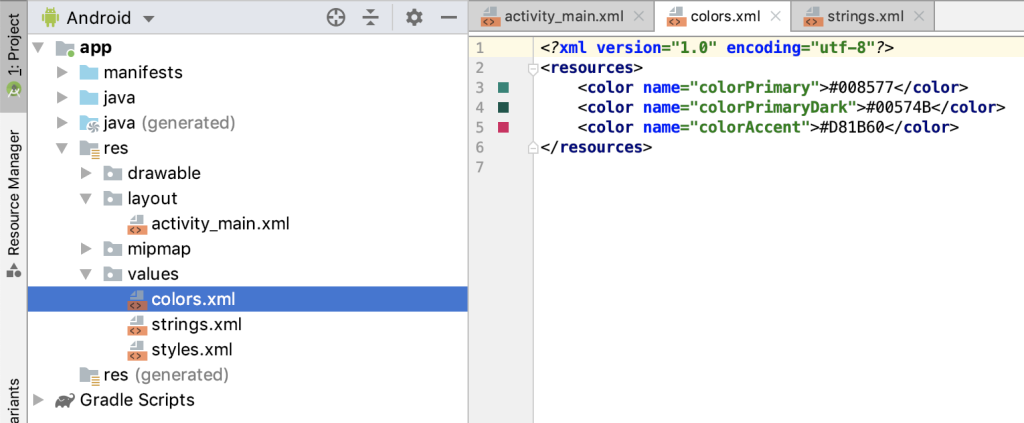Powerful Click To Action – Android App Java Example: Simplified And Eye-Catching
Android App Java Example
Introduction
Dear Readers,
1 Picture Gallery: Powerful Click To Action – Android App Java Example: Simplified And Eye-Catching
Welcome to our informative article about Android app Java examples. In today’s digital age, the use of smartphones has become ubiquitous, and Android apps have revolutionized the way we interact with our mobile devices. Java, being one of the most popular programming languages, is widely used for developing Android applications. In this article, we will explore the world of Android app development with Java and provide you with a comprehensive understanding of its capabilities and benefits.

Image Source: android.com
Before we dive into the details, let’s first take a look at what Android app Java examples are and why they are important. Android app Java examples refer to the source code and implementation of various Android applications using the Java programming language. These examples serve as valuable references for developers, allowing them to learn from existing projects and understand the best practices for building their own Android apps.
Now, let’s explore the world of Android app Java examples together and discover the endless possibilities they offer.
What is Android App Java Example?
Android app Java example refers to a sample application developed using the Java programming language specifically for the Android platform. These examples showcase different functionalities and features that can be incorporated into Android apps. They serve as a starting point for developers, helping them understand how to structure their code and implement specific functionalities.
Android app Java examples cover a wide range of topics, including user interfaces, data storage, network communication, multimedia, and much more. By studying these examples, developers can gain valuable insights into the best practices and design patterns for building robust and user-friendly Android applications.
Now, let’s move on to the next section and explore who can benefit from Android app Java examples.
Who Can Benefit from Android App Java Example?
Android app Java examples are beneficial for various individuals and groups involved in Android app development. Whether you are a beginner, an experienced developer, or a technology enthusiast, these examples can provide valuable insights and learning opportunities.
Beginner developers can utilize Android app Java examples to understand the fundamentals of Android app development and learn how to write clean and efficient code. By studying existing examples, beginners can grasp the essential concepts and gain hands-on experience before starting their own projects.
Experienced developers can benefit from Android app Java examples by exploring advanced techniques, design patterns, and innovative ideas implemented in these examples. They can adapt and modify existing code to suit their specific requirements, saving time and effort in the development process.
Technology enthusiasts can also explore Android app Java examples to stay updated with the latest trends and advancements in the Android app development domain. By analyzing existing examples, they can gain insights into emerging technologies and experiment with new features.
Now that we know who can benefit from Android app Java examples, let’s delve into the next section to discover when these examples are useful.
When to Use Android App Java Example?
Android app Java examples can be used in various scenarios depending on the needs of developers and their projects. Here are some situations where these examples can be particularly useful:
1. Learning: If you are new to Android app development or Java programming, studying Android app Java examples can provide you with a solid foundation. You can learn the basics, understand the structure of Android apps, and familiarize yourself with essential concepts.
2. Troubleshooting: When encountering issues or bugs in your own Android app, referring to relevant Java examples can help you identify and resolve the problem. By comparing your code with a working example, you can pinpoint any discrepancies and find effective solutions.
3. Feature Implementation: If you want to add a specific feature or functionality to your Android app, studying related Java examples can provide you with insights on how to implement it. You can analyze the code, understand the logic behind the feature, and adapt it to fit your app’s requirements.
4. Optimization: Android app Java examples can also be helpful in optimizing the performance of your app. By studying efficient implementations and following best practices, you can improve the speed, responsiveness, and overall user experience of your app.
5. Inspiration: Lastly, Android app Java examples can serve as a source of inspiration and ideas for your own projects. By exploring different examples and studying innovative solutions, you can enhance your creativity and develop unique features for your app.
Now that we have covered when to use Android app Java examples, let’s move on to the next section to explore where you can find these examples.
Where to Find Android App Java Example?
Android app Java examples are widely available on various platforms and resources, making it easy for developers to access and study them. Here are some popular sources where you can find Android app Java examples:
1. Official Android Documentation: The official Android documentation provides a comprehensive guide to Android app development, including numerous code samples and examples. You can explore the official documentation to find examples related to specific topics and functionalities.
2. Open-Source Projects: Many open-source Android apps are available on platforms like GitHub, Bitbucket, and GitLab. These projects often share their source code, allowing developers to study and learn from them. You can search for open-source Android apps in your area of interest and explore their implementation details.
3. Online Tutorials and Blogs: Several online tutorials and blogs focus on Android app development and provide step-by-step explanations along with code examples. Websites like Medium, DZone, and Android Developers Blog offer valuable resources for developers at all skill levels.
4. Android Developer Communities: Joining Android developer communities, such as Stack Overflow, Reddit, and Google Groups, can be a great way to connect with fellow developers and seek advice. These communities often share code snippets and examples to help each other solve problems and improve their skills.
5. Books and eBooks: Many books and eBooks cover Android app development using Java and provide in-depth explanations along with code examples. These resources can be valuable references for developers looking to gain comprehensive knowledge and learn from real-world examples.
Now that you know where to find Android app Java examples, let’s move on to the next section to discover the advantages and disadvantages of using Java for Android app development.
Advantages and Disadvantages of Android App Java Example
Just like any other technology, using Java for Android app development comes with its own set of advantages and disadvantages. Let’s take a closer look at the pros and cons of using Java for developing Android apps:
Advantages:
1. Wide Adoption: Java has been around for decades and is widely adopted by developers worldwide. This means that there is a vast community of Java developers who can contribute to and support your Android app development project.
2. Rich Ecosystem: Java has a rich ecosystem of libraries, frameworks, and tools specifically built for Android app development. This makes it easier to find and leverage existing solutions, saving time and effort in the development process.
3. Platform Independence: One of the key advantages of Java is its platform independence. Android apps written in Java can run on various devices, regardless of the underlying hardware or operating system.
4. Performance: Java offers excellent performance, especially when combined with optimization techniques and best practices. Android apps developed using Java can deliver smooth and responsive user experiences.
5. Security: Java provides robust security features that help protect Android apps from unauthorized access and malicious attacks. The Java Virtual Machine (JVM) ensures a secure execution environment for the app’s code.
Disadvantages:
1. Learning Curve: Java has a steep learning curve, especially for developers who are new to the language. It requires a solid understanding of object-oriented programming concepts and syntax.
2. Memory Consumption: Java-based Android apps tend to consume more memory compared to apps developed using other languages. This can impact the app’s performance, especially on devices with limited resources.
3. Build Time: Building and compiling Java-based Android apps can be time-consuming, especially for larger projects. The process often involves multiple steps and dependencies that need to be resolved.
4. App Size: Java-based Android apps generally have a larger file size compared to apps developed using other languages. This can affect the app’s download and installation time, as well as the device’s storage space.
5. Garbage Collection: Java’s automatic garbage collection can sometimes lead to performance issues, particularly if not managed properly. It is crucial to optimize memory usage and handle object disposal efficiently.
Frequently Asked Questions (FAQ)
1. Is Java the only programming language used for Android app development?
No, Java is not the only programming language used for Android app development. While Java has been the traditional choice, developers now have the option to use Kotlin, a modern programming language endorsed by Google for Android development.
2. Can I develop Android apps without coding experience?
Developing Android apps without coding experience is challenging but not impossible. There are visual programming tools and app builders available that allow you to create basic apps without writing code. However, coding skills are essential for more complex app development tasks.
3. Are there any alternatives to Android app Java examples for learning Android development?
Yes, apart from Android app Java examples, you can also explore online courses, video tutorials, and coding bootcamps specifically designed to teach Android app development. These resources provide structured learning paths and hands-on projects to enhance your skills.
4. Can I use Java to develop iOS apps?
No, Java cannot be used to develop native iOS apps. Apple’s iOS platform primarily uses Objective-C and Swift programming languages for app development. However, there are frameworks like React Native and Xamarin that allow you to write cross-platform apps using Java.
5. How long does it take to develop an Android app using Java?
The time taken to develop an Android app using Java varies depending on various factors such as the complexity of the app, the experience of the developer, and the availability of resources. Simple apps can be developed within a few weeks, while complex apps may take several months or more.
Conclusion
Dear Readers, we hope this article has provided you with valuable insights into the world of Android app Java examples. By studying these examples, you can enhance your Android app development skills, learn best practices, and create innovative and user-friendly applications.
Throughout this article, we explored what Android app Java examples are, who can benefit from them, and where to find them. We also discussed the advantages and disadvantages of using Java for Android app development and answered some frequently asked questions.
Now, it’s time for you to take action. Start exploring Android app Java examples, experiment with different functionalities, and unleash your creativity. Whether you’re a beginner or an experienced developer, continuous learning and hands-on practice will help you master the art of Android app development.
Thank you for joining us on this journey. We wish you all the best in your Android app development endeavors.
Final Remarks
Disclaimer: The information provided in this article is for educational and informational purposes only. The content is based on our research and understanding of the topic. We do not guarantee its completeness or accuracy. The use of any information provided in this article is solely at your own risk.
Friends, please note that technology is constantly evolving, and new updates and advancements may have been introduced since the publishing of this article. It is always advisable to refer to official documentation, seek expert advice, and stay updated with the latest developments in the Android app development field.
This post topic: Android Apps
